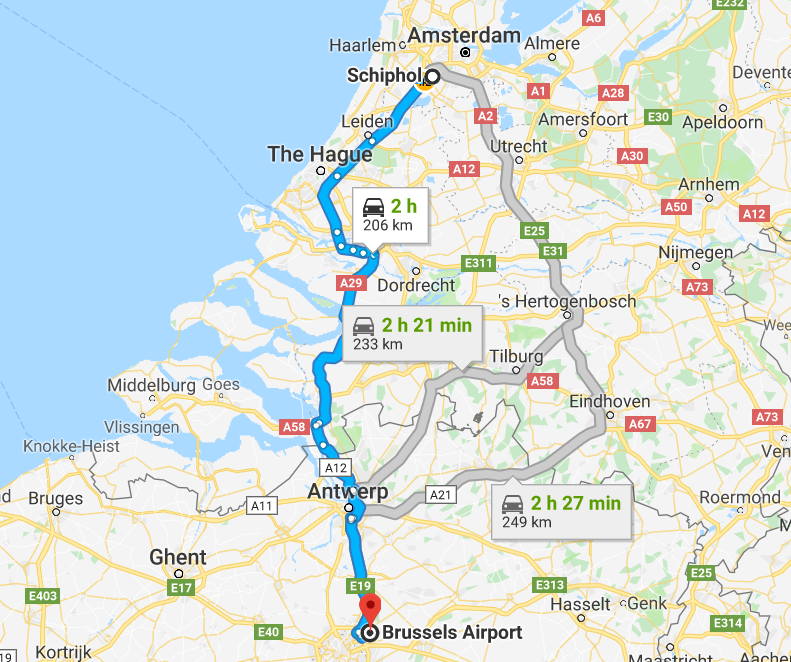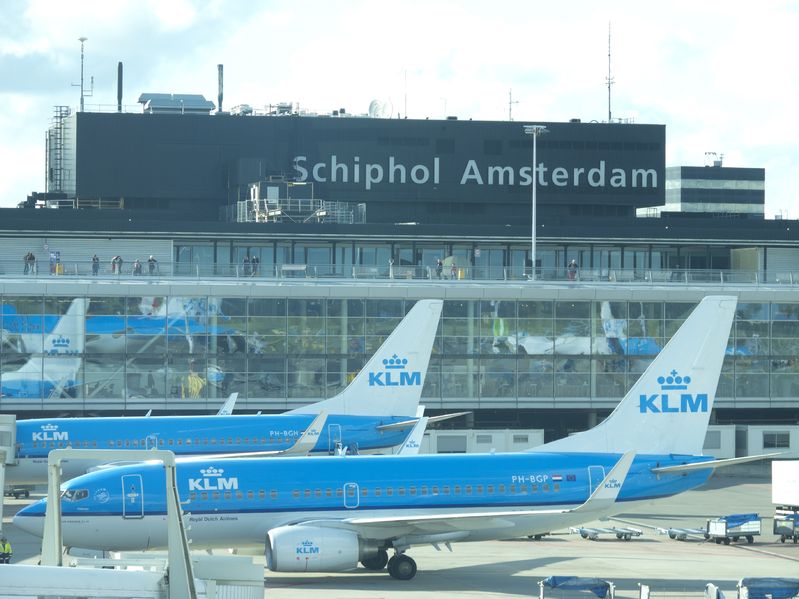There’s a move afoot to end flights between Brussels and Amsterdam, because members of the Dutch government believe the flight is too short.
KLM currently runs 5 flights a day between the two cities.

Amsterdam and Brussels airports are about 125 miles apart if you’re driving, 98 miles by air.

Dutch members of parliament want these flights banned. They say the cities are so close together that people should take the train or a bus instead of flying, in the interests of the environment.

Copyright: flaperval / 123RF Stock Photo
In fact people traveling between the two cities generally do take the train, opting to fly KLM in and out of Brussels when they’re connecting in Amsterdam to points beyond such as making a transatlantic trip or a journey to Asia. It’s not the short hop on the ERJ-175, ERJ-190, or Boeing 737 that’s contributing the bulk of the carbon dioxide emissions from the trip.
KLM flies in and of of Brussels in order to compete in the Brussels market for travel throughout the world, since they operate a global hub. They aren’t filling planes with origin and destination traffic.
Advocates of eliminating the flights suggest that at a congested airport like Schipol there’s no reason to be using scarce takeoff and landing positions for Brussels flights, and that the capacity could be better utilized if people took the train. Of course connecting passengers then must get from the train station to the airport which entails CO2 emissions as well, not to mention inconvenience.
The Dutch government just invested in Air France KLM, it would seem odd to cede market share for the group to competitors like Lufthansa Group (which controls Brussels Airlines) and to British Airways. Despite the claim, by the way, that the UK’s Air Passenger Duty is meant to benefit the environment connecting itineraries originating outside Britain are exempt from the tax (though such passengers are presumably contributing more to emissions).


“Of course connecting passengers then must get from the train station to the airport which entails CO2 emissions as well, not to mention inconvenience.”
Thalys has essentially hourly trains between Amsterdam airport and downtown Brussels. This seems like a situation ripe for setting up a codeshare between KLM and Thalys like the Amtrak-United one out of EWR.
“Of course connecting passengers then must get from the train station to the airport which entails CO2 emissions as well”
Oh yeah, walking 200m is soo much CO2 emissions… Please realize both airports have a main line train station literally within the terminal building, closer to the security than most gates on the other side.
In Germany there is a codeshare for Lufthansa on the DeutscheBahn, train from Dusseldorf or Cöln to FRA.
I’ve taken this flight a few times from Brussels to connecting KLM flights. it was much quicker than the train ..
for Paris for my Af flights there’s an AF office who take your luggage before boarding a code-share TGV into CDG.l at the midi train station so it should be doable though for Amsterdam
I came to say the same thing. Hourly train at $60 with advanced booking directly from the airport to Brussels. This coupled with Immigration letting you out at the steps of the train station make this the ideal place to take this train journey. Also, nearly every DeutscheBahn train leaving amsterdam stops here if it’s not an ICE.
KLM/Thalys Train sounds great !
Thalys has hourly service from Amsterdam Central (also stops at Airport Schiphol) to Brussels City Main station and in reverse direction.
Oddly, only one train a day in each direction stops also at Brussels Zaventum Airport. Perhaps they can increase the # of trains that make that stop – or dedicate – with Thalys – one train AMS – BRU airports.
Not sure why getting from the train station to the airport involves in CO2 emissions since both airports have a train station & ticketing office in the airport
Actually, people will likely connect to other hubs further away like Frankfurt or London which will increase the total carbon output.
Unlike in the US, in Europe most airports are built with train hubs. In the case of AMS, I’ve ironically connected there when traveling by train far more often than by plane — just about every city in NL has direct service to AMS. I agree with the dutch government. With AMS built literally on top of the main high speed rail line to Brussels, I’m a bit surprised they haven’t already figured out a code-share thing like UA has with Amtrak through EWR.
Maybe they are confused and think Amsterdam is part of Brexit 🙂
Garry with all the respect you should study the topic better.
Brussels Midi station has a ZYR code. KL has been codesharing with Thalys for at lest 5 years (as far as I can remember and using the service) which connects Schiphol to ZYR and Antwerp directly. There are 10-15 train runs a day, it takes 1 hour and 20 min from Schiphol to ZYR. The only inconveniences:
– you need to get a paper ticket from a train desk on arrival to Schiphol (though they’re testing online check in for a train segment)
– you need to carry your baggage on a train ride
Still its a way better than flying. I can recall last August I took a Thalys train from Amsterdam Centraal to Brussels. It left Amsterdam Centraal basically empty with 5 to 7 pax for a train cart. The next stop – Schiphol – and all the seats were taken (by KL pax).
Is their any data showing these planes exhausts more emissions than a train per person? I get the feeling it’s closer than you think and likely not significant. I also agree this is likely not people commuting to work but connections for longer flights. This type of traffic with people who want to fly to or from Brussels aren’t going to just shift to the train, they’ll likely shift to other airlines and connect elsewhere possibly with less efficient routings producing little change in emissions. Probably causing klm to lose most of their Brussels business in the process. Call me a pessimist but I get the feeling this is more about politics and less about saving the environment.
@Denis – a codeshare with a train, and a connecting train, is not better than a single flight
@Rick how on earth are train-train connections CO2 free?
@Denis – a codeshare with a train, and a connecting train, is not better than a single flight
Pardon me, I can’t get what you’re talking about. There are direct trains between AMS and Brussels city centre that have KL code and sold as part of KL itineraries that run hourly. You don’t need to take commuter train or anything. What’s better than this?
The whole Dutch railway system is powered by alternative sources like wind and sun. Ergo, no CO2 emissions.
Actually, this would be good news for KLM as it would free up slots in AMS.
Must be a slow news day. Gary, why don’t you write a post on why we shouldn’t read too much into each of the 40 or so other countries’ grounding of the Boeing 737 MAX?
https://viewfromthewing.com/2019/03/11/dont-read-too-much-into-china-and-indonesia-grounding-the-boeing-737-max/
@EV if that were true they’d do it on their own
@DEP, yes, there is evidence, tons of studies have been done about emissions. Trains can have as much as 10x fewer emissions per passenger mile. Short haul flights are paritcularly bad (larger percentage of time spent at the energy intense climb than the efficient cruise). This is a fun website that lets you compare emissions for different modes on specific routes: http://www.ecopassenger.org/bin/query.exe/en?L=vs_uic
Not to mention, train lines are electrified (mostly), which means that there is a potential for them to eventually be powered by completely zero-emission energy, while planes cannot be. Plus, just from a generic energy efficiency PoV, rail is the basically the most efficient means of transport (very low rolling resistance from metal wheels on rails) and planes are about the least efficient (incredibly fast acceleration needed at start, need to lift a bunch of weight into the air, etc.).
It is possible to travel by train between the two airports in 2 hours. Once everything else is taken into account, flying is unlikely to beat that. As others have pointed out, the obvious solution would be a codeshare between KLM and the rail operator.
@ Gary — We have to get from BRU to our hotel in central Amsterdam next month. We were going to take the train, but now maybe I think we should fly before it is no longer an option.
A belated note: There’s a precedent to this by the other half of the KLM Air France Group: Air France discontinued air service to and from Brussels some time ago, and offers service only through code-shares on trains between CDG airport station and the Gare du Midi in Brussels (airport code ZYR).
I don’t know how this has affected the position of Air Fracne in the Brussels market.
But as apersonal example of what this means: I travel regularly between San Francisco and Brussels. With no direct flight between Brussels and the US West Coast, I have found the AF routing SFO-CDG-ZYR to be the most reliable, fastest, and (in most situations) easiest routing between SFO and Brussels. I will generally pay a little more for this routing than for any other.
(ZYR is more conveneient to central Brussels or most other destinations in Belgium than BRU airport. Even coach passengers in any AF fare class travelling to/from ZYR get the use of a dedicated AF lounge at ZYR comparable to many business-class lounges, and certainly better than most coach-class waiting areas including those at BRU airport. The dedicated AF rail cars between CDG and ZYR are comparable to premium-class Thalys or SNCF TGV trains, with complementary at-seat meal service, extra luggage storage spac, etc.)
Brussels is evencloser by train to AMS than to CDG, so the advantage of conecting to a train for the short leg of a long-haul journey to or from Brussels, rather than a short flight, would probably be even more true for travel via AMS than via CDG.
Very notably, the AF/KL group *already* knows how to work with this rail line, and *already* has a dedicated check-in facility and passenger lounge at ZYR (for AF passengers travelling via CDG) that could also used for KL passengers travelling via AMS.
With all this in mind, I don’t think you can assess the pros and cons of a switch from feeder fligths BRU-AMS to KL rail codeshares ZYR-AMS without taking into consideration the AF experience, facilities, and operating agreements at ZYR and discontinuation of CDG-BRU flights.